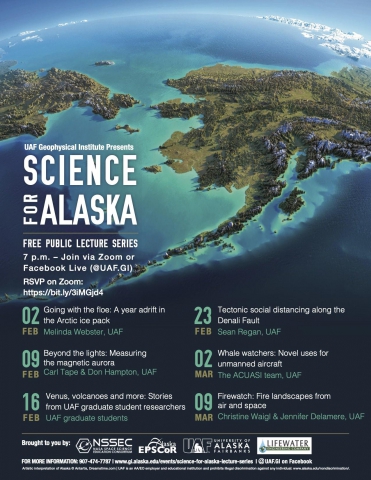In 2016, the National Science Foundation (NSF) unveiled a set of “Big Ideas,” 10 bold, long-term research and process ideas that identify areas for future investment at the frontiers of science and engineering. The Big Ideas represent unique opportunities to position our Nation at the cutting edge of global science and engineering leadership by bringing together diverse disciplinary perspectives to support convergence research. As such, even though proposals must be submitted to the Directorate for Geosciences when responding to this solicitation, once received, the proposals will be managed by a cross-Directorate team of NSF Program Directors.
Arctic temperatures are warming faster than nearly everywhere else on Earth, with some models projecting that continued warming could produce an ice-free Arctic Ocean in a few decades. The rapid and wide-scale changes occurring in response to this warming portend new opportunities and unprecedented risks to natural environments; social and cultural systems; economic, political and legal systems; and built environments of the Arctic and across the globe. Gaps in scientific observations and the prevalence of interdependent social, natural, and built systems in the Arctic make it challenging to predict the region's future. Understanding and adapting to a changing Arctic requires creative new directions for Arctic-related research, education, workforce development, and leveraging of science, engineering, and technology advances from outside the Arctic.
Navigating the New Arctic (NNA) embodies an important forward-looking response by the Foundation to these profound challenges. NNA seeks innovations in fundamental convergence research across the social, natural, environmental, computing and information sciences, and engineering that address the interactions or connections among natural and built environments and social systems, and how these connections inform our understanding of Arctic change and its local and global effects.
This solicitation requests proposals that fall within one of three tracks: NNA Planning Grants, dedicated to developing convergence research questions and teams to tackle projects of larger scope in the future; NNA Research Grants, aimed to support creative projects on fundamental research that address convergent scientific and engineering challenges related to the rapidly changing Arctic; and NNA Collaboratory Grants, designed to support collaborative teams undertaking research and training initiatives on critical themes of a broad scope related to the New Arctic. This solicitation is the third of what is envisioned to be at least a five-year agency-wide program to support the research and dissemination of new knowledge needed to inform the economy, security, and resilience of the Nation, the larger Arctic region, and the globe with respect to Arctic change.

